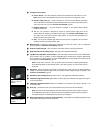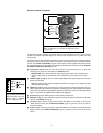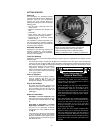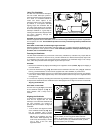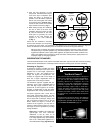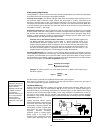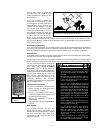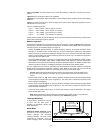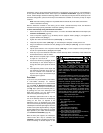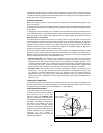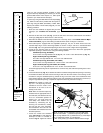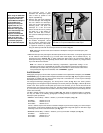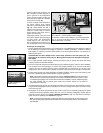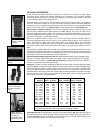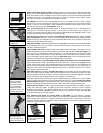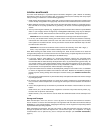
- 15 -
applications and for casual astronomical observation. The telescope may be placed on a rigid tabletop or
on the optional Meade #883 Deluxe Field Tripod (see
OPTIONAL ACCESSORIES, page 20) to provide a
secure, variable-height, altazimuth observing platform. To manually track objects with the telescope in the
altazimuth configuration, press the Arrow keys of the Electronic Controller as necessary to keep an object
centered.
Note: Automatic tracking of objects is not possible with the ETX-90 EC, ETX-105EC and the ETX-
125EC in the Alt/Az mounting.
With the Electronic Controller in the factory pre-set “Alt/Az” (vertical-horizontal) mode, the Electronic
Controller Arrow keys permit pushbutton movements (slewing) of the telescope.
To move the telescope using the Electronic Controller:
1. Set the telescope on a level and stable surface, or mount to the Meade #883 Deluxe Field Tripod (see
OPTIONAL ACCESSORIES, page 20).
2. Insert a low-power eyepiece (e.g., SP 26mm) into the eyepiece holder (4, Fig. 1) and tighten the
eyepiece thumbscrew (3, Fig. 1).
3. Tighten the vertical and horizontal locks (6 and 9, Fig. 1), if necessary.
4. Verify that the power switch (10A, Fig. 1) on the telescope’s Computer Control panel is OFF.
5. Plug in the Electronic Controller coil cord (4, Fig. 3) to the HBX port (10C, Fig. 1) on the Computer
Control panel.
6. Flip the power switch to ON. The power indicator (10E, Fig. 1) on the Computer Control panel lights
and all four speed indicators (2, Fig. 3) blink rapidly.
7. Press any key on the Electronic Controller and the telescope slews momentarily in the vertical and
horizontal directions to test the motors.
8. When the test is complete, light 1 remains
on; lights 2, 3, and 4 turn off.
9. Use the four Arrow keys (1, Fig. 3) to slew
the telescope to the desired object. To
change the slew speed, press the SPEED
key.
10. Fine-adjust the position of the object with
the Electronic Controller Arrow keys so
that it is centered in the viewfinder. The
object is now ready to be viewed through
the telescope’s eyepiece.
Polar Mode
If you are to use your ETX-90EC, ETX-105EC,
or ETX-125EC telescope for extensive
astronomical applications, it is recommended
you use Polar or Equatorial mounting. By
tilting one of the telescope’s mechanical axes
(see Fig. 10) to point at the celestial pole (i.e.,
by pointing one axis of the telescope to the
North Star, Polaris), you may follow (track)
astronomical objects through the sky.
The telescope's optical tube turns on only one
axis of the telescope instead of simultaneously
turning on two axes, as required of the
Altazimuth mount. An Equatorial mount which
has one of its axes (the polar axis) pointing to the
celestial pole is said to be polar aligned. The ETX
models can be polar aligned either by using the
optional #883 Deluxe Field Tripod or the table
tripod specific to your model of ETX telescope
(see
OPTIONAL ACCESSORIES, page 20).
With the ETX polar aligned, the telescope’s
internal motor drive may be activated (see
APPENDIX A, page 26) to enable fully automatic
hands-off tracking of celestial objects. In this
TIPS
FOR BEGINNERS
Surf the Web
One of the most exciting resources for astronomy is
the Internet. The Internet is full of websites with
new images, discoveries, and the latest
astronomical information. For example, when
comet Hale-Bopp made its approach to our Sun in
1998, astronomers around the world posted new
photos daily.
You can find websites for virtually any topic relating
to astronomy on the internet. Try the following key
word searches: NASA, Hubble, HST, astronomy,
Messier, satellite, nebula, black hole, variable stars,
extrasolar, Chandra, gamma burster, etc.
Check out Meade’s website for the latest product
and technical information. You can download the
latest software revisions, links to other
astronomical sites, coordinates of celestial objects
and the latest satellite tracking information for the
optional #497 Autostar handset. See page 20 for
more information. You’ll find our website at:
http://www.meade.com/
Here are some other sites you might find useful:
• Sky & Telescope:
http://www.skypub.com/
• Astronomy:
http://www.astronomy.com/astro/
• The Starfield:
http://users.nac.net/gburke/
• Astronomy Picture of the Day:
http://antwrp.gsfc.nasa.goc/apod/
• Heavens Above (satellite observing information):
http://www.heavens-above.com/
• Photographic Atlas of the Moon:
http://www.lpi.ursa.edu/research/lunar_orbiter
• Hubble Space Telescope Public Pictures



